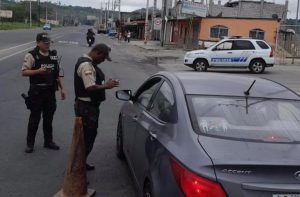By: Sallie Moppert
Impunity Watch News Staff Writer
SAN JOSE, Costa Rica – A recent judgment handed down by the Inter-American Court of Human Rights, IACHER, determined that Ecuador was responsible for the violation of the right to life of two individuals who died following a traffic stop and subsequent police chase in 1997. In addition to the violation of the right to life, the Court also found several other violations, including the right to humane treatment, right to a fair trial, and right to judicial protection of their next of kin.

Photo courtesy of MSN News 360.
Walter Huaćon Baidal and Mercedes Salazar Cuevos were leaving a family reunion on the afternoon of March 31, 1997. While driving, the pair encountered a traffic checkpoint, where Baidal realized he had forgotten his driver’s license and vehicle documents. Baidal turned the car around, driving on the wrong side of the road, to drive to his house to obtain his missing documents. Members of the Traffic Commission, which had been conducting the traffic checkpoint, witnessed Baidal making an illegal turn and driving on the wrong side of the road, leading to two members of the Traffic Commission and four police officers giving chase.
The officers eventually caught up to Baidal and Cuevos and pulled the vehicle over. Baidal and Cuevos were removed from the vehicle and were fatally shot and killed by the officers. Administrative and judicial proceedings were brought against the officers involved in the incident. Five officers were dismissed and, while charges were brought against the sixth officer, he did not appear at the trial. As a result, the proceedings were suspended and the case was eventually declared beyond the statute of limitations on October 11, 2012.
The Court found that the lethal force used by the police force was unjustified and disproportionate, and amounted to nothing more than extrajudicial executions, thus violating the right to life of Baidal and Cuevos. In addition, the officers’ treatment of Baidal and Cuevos during the traffic stop violated their right to humane treatment. The IACHER also determined that Ecuador’s investigation and review of the facts of the case in the police criminal court as opposed to being held in a court with an impartial authority, violated their right to an effective judicial remedy. In addition, Ecuador did not carry out the investigative process with due diligence or within a reasonable period of time. Finally, the Court noted that the families of Baidal and Cuevos had not been able to obtain the truth of the situation and the determination of who was responsible for the incident in the ordinary criminal justice system.
Based on its findings, the IACHER ordered Ecuador to make full reparations for the human rights violations declared in the report, provide the necessary physical and mental health care measures for the family members of Baidal and Cueva, conduct a full and effective investigation of the human rights violations stated in the report, develop and introduce ongoing training programs for police agents, as well as the establishment of protocols on the use of force, introduce measures to ensure effective accountability in the criminal, disciplinary or administrative courts, and introduce measures to strengthen investigative capacity, with due diligence and in accordance with relevant international standards, on possible extrajudicial executions in the context of the use of lethal force by police officers, so that effective protocols are in place to carry out such investigations.
For further information, please see: